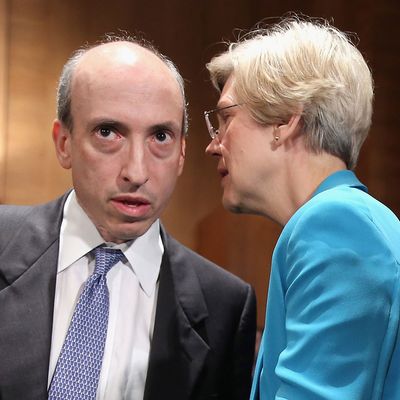
On a warm evening in late September 2023, Mike Novogratz, the billionaire hedge funder turned crypto investor, walked into a restaurant in Washington, D.C. In town from New York, the CEO of Galaxy Digital had spent the day on Capitol Hill visiting with Congress as part of a contingent of crypto entrepreneurs — most of them young people of color — organized by industry giant Coinbase to send a message to Democrats at a moment when crypto was increasingly seen as a Republican cause. Some key lawmakers hadn’t even shown up to the meetings. “I’m a Democrat, and it’s incredibly frustrating that they don’t see crypto as progressive,” Novogratz, an outspoken progressive who has donated millions of dollars to the party, including to Joe Biden in 2020, told me.
One Democrat was causing more frustration than any other: Gary Gensler, the chair of the Securities and Exchange Commission. He had spent the bulk of his tenure in the Biden administration attacking crypto, rejecting the need for new industry regulations, suing or threatening a wide swath of crypto companies, and blocking new products like crypto ETFs. And much of the party seemed to be taking their cues from him.
“Gensler is becoming a real problem for our industry,” lamented Novogratz of his former Goldman Sachs colleague. “Part of me wants to take him by the neck and crack it. And I probably would, but I don’t want to get blood on my nice suit.” He gestured to his cream-colored attire.
Now, nine months later, many elected Democrats have done a legislative version of what Novogratz had in mind and offered a meaningful (if partial and hardly unanimous) rebuke of Gensler and the faction of the party — led by Senator Elizabeth Warren — that has been fiercely anti-crypto. In May, the Senate voted 60-38, including 11 Democrats and independent Kyrsten Sinema, to roll back an SEC accounting rule for digital assets, defying a veto threat by President Biden. (The bill would have allowed financial institutions to hold crypto on behalf of customers without having to account for it on their balance sheets, treating it the same way as traditional assets.) Chuck Schumer voted for it, an unusual move by the Democrat and Senate majority leader in that he effectively bucked the will of his party’s leader. So did Senators Cory Booker, Kirsten Gillibrand, and Ron Wyden. Then, a week later, 71 Democrats, including former Speaker Nancy Pelosi, helped pass the Financial Innovation and Technology for the 21st Century Act, or FIT21, in the House, against the opposition of Gensler’s SEC and the White House — a historic event in that it was the first successful vote for a bill that sets out to regulate cryptocurrency at all. Both measures were actively supported by crypto-industry lobbying groups. Late in the evening on the last Friday in May, Biden followed through on vetoing the Senate measure, but the parallel actions by both houses of Congress on two separate pieces of legislation unmistakably signified the moment when the Democrats ceased to be a straightforwardly anti-crypto party.
“In terms of the public policy, Gary Gensler is just wrong about this,” Congressman Wiley Nickel, a North Carolina Democrat who co-sponsored the House bill, told me. He hoped the vote (regardless of the bill’s fate in the Senate) would signal that many Democrats do not share the beliefs of Gensler and Warren. “If Biden allowed Gary Gensler to be the only voice on this, he definitely would lose a significant number of votes,” Nickel added. “If the Democratic Party were the party opposed to web3, to blockchain and crypto, we would only lose votes.”
Then on May 23, another surprise twist complicated the picture even more. After initially signaling that it would block a slate of new financial products (called ETFs, or exchange-traded funds) that would allow average investors a much easier route to purchase ethereum, the second-largest cryptocurrency, the SEC suddenly — and, to many observers, shockingly — flipped and approved eight of them, including one from Novogratz’s company. “The sense is that the tone from the SEC has just changed literally overnight,” Emilie Choi, the president and COO of Coinbase, said at a conference just before the approval. “Probably the administration sensing some panic, I guess.”
There were signs that in the weeks leading up to these developments, Democrats had indeed begun to panic about the political implications of being pegged as hostile to crypto. Probably not coincidentally, this occurred after Donald Trump announced that his campaign would accept donations in crypto and that he would “build a crypto army moving the campaign to victory on November 5th!” At a campaign event for holders of Trump’s NFTs at Mar-a-Lago in May, the former president called up Ryan Selkis, an influential crypto entrepreneur who had previously voted for Biden, to speak at the podium, and Selkis threw his weight behind Trump.
“All of a sudden, the Democrats in crypto, the tenor of their conversation on the Hill and their friends in the White House, changed. It went from ‘Guys, you really should pay attention to this’ to ‘Oh my God, we’re going to lose,’” says a person close to the industry. “You’ve listened to Gary Gensler and Elizabeth Warren for so long, and now we’re backed into a corner.” Warren, of course, has been a chief enemy of crypto for years, making her belief that the industry is primarily a scam a core part of her platform. In a campaign ad last year, she included the Politico headline “Elizabeth Warren Is Building an Anti-Crypto Army.”
Pressure had been building on Democrats to extend an olive branch to crypto supporters for months. A Coinbase-backed pro-crypto super-PAC called FairShake, which has raised nearly $100 million this election cycle, helped defeat Katie Porter in the California Senate primary in March, running attack ads against her for being an ally of Warren’s. Recent polls showed that 20 percent of registered voters have owned crypto, amounting to some 35 million Americans, disproportionately made up of young Black men — an important cohort to Democrats. “That’s a very sizable group, and a lot of them are single-issue voters,” says Nickel. “And they were being organized, and real money, material money, was going into it,” says a veteran Democratic strategist.
“This is one of those issues that there’s no one really against it. You’re not going to pick up any new votes for being against crypto,” says the strategist. “There’s only upside politically and policywise to be for it, and only downside politically and policywise to be against it.”
The crypto landscape has also changed recently. While many in Washington had believed — or hoped — crypto would simply die and disappear after the collapse of FTX and the incarceration of Sam Bankman-Fried, the opposite proved true: Bitcoin recently traded at all-time highs thanks in part to new bitcoin ETFs, approved by Gensler’s SEC in January, that made the cryptocurrency more accessible to regular Americans. Yet the SEC and Congress had yet to lay out a regulatory path for the industry to operate legally, nor had they enacted much in the way of practical protections for consumers. Frustration was growing among Democrats that they had fumbled the issue in a way that might even cost them a meaningful number of votes in 2024. “The approach that both Gary Gensler and Elizabeth Warren have advocated, refusing to regulate the technology on the grounds that that will be the best way to kill the technology, no longer makes any sense — it’s a failed policy,” says a person who has worked in prior Democratic administrations. “Based on our polling, there are millions of voters who are going to vote against Joe Biden on the basis of Gary Gensler’s approach on this issue. With democracy on the line, that’s just a phenomenally irresponsible approach to take.”
While Congressional Democrats were reluctant to admit that Trump’s pivot from a not particularly crypto-friendly first term had played a role in how they got a higher-than-expected number of their peers to vote for legislation favored by the crypto industry, Washington lobbyists and crypto advocates said it seemed to break the dam. “The shift is due to a long-term engagement effort by industry with congressional Democrats. The landslide is due to one person: President Trump,” Selkis told me. “The president broke Elizabeth Warren’s evil spell over the Democrats in the Senate, House, and White House.”
Whether the White House will adopt a friendlier crypto stance before the election is still something of a mystery. There are signs that a shift is in progress, though. Notably, Biden did not threaten to veto the House legislation the way he did the Senate measure, saying instead that while he opposed it, he was “eager to work with Congress to ensure a comprehensive and balanced regulatory framework for digital assets.” (Justin Slaughter, the policy director for Paradigm, a crypto VC firm that has been one of the most active industry players in Washington, called it “the most positive statement by this or any White House on crypto, ever.”)
Biden’s late-Friday veto of the Senate bill followed a flurry of efforts by Democrats in Congress to talk him out of it, including coming up with alternative paths to give Biden an out without going back on his word. Nickel, for one, told me he hoped Gensler would just withdraw the rule altogether. There is significant skepticism within the party about whether Biden’s action was the right move. With its anti-crypto tenor, the veto amounts to “political malpractice,” says the Democratic strategist, using a term I heard from other Democrats about the White House’s crypto approach. “I do think the White House, sooner rather than later, is going to make the decision that they don’t want Gary Gensler to potentially impact their ability to win the election. And he has, full stop — he has. Millions of crypto voters are going to vote up or down on this.”
Even for pro-crypto Democratic voters, though, flipping pro-Trump on this single issue is a huge leap. “There’s a lot of soul-searching happening in the industry, and it is quite complicated for a lot of folks who grew up voting Democrat to think on some level, Why does this guy that I voted for, and this party that I voted for, want to put my industry out of business?” says the person close to the crypto industry. “I’ve seen colleagues wrestle with this.”






























